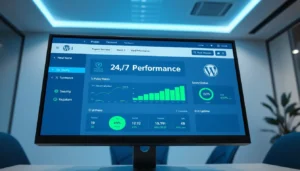In today’s rapidly evolving digital landscape, web development skills have become the cornerstone of business success and technological innovation. Whether you’re a business owner seeking to understand what makes a competent development team, or an entrepreneur looking to hire the right talent, mastering the knowledge of essential web development skills is crucial for making informed decisions that drive growth and competitive advantage.
The demand for skilled web developers has reached unprecedented heights, with the Bureau of Labor Statistics projecting a 13% growth in web development employment through 2030—much faster than the average for all occupations. Understanding the specific web development skills that separate exceptional developers from mediocre ones can mean the difference between a project that transforms your business and one that drains your resources without delivering results.
This comprehensive guide explores the critical web development skills that modern businesses need, from fundamental programming languages to advanced frameworks and emerging technologies. We’ll examine how these skills translate into real-world business value, what to look for when hiring developers, and how to ensure your web development projects deliver maximum return on investment. By understanding these web development skills, you’ll be equipped to make strategic decisions that position your business for digital success.
Understanding the Foundation of Modern Web Development Skills

Web development skills encompass a broad spectrum of technical competencies, creative abilities, and problem-solving capabilities that enable developers to create functional, user-friendly, and scalable web applications. These skills have evolved significantly from the early days of simple HTML pages to today’s complex, interactive web experiences that power everything from e-commerce platforms to social media networks.
The foundation of web development skills begins with understanding the three core technologies that power the web: HTML (HyperText Markup Language), CSS (Cascading Style Sheets), and JavaScript. HTML provides the structural framework of web pages, defining elements like headings, paragraphs, links, and images. CSS handles the visual presentation, controlling layout, colors, fonts, and responsive design elements that ensure websites look professional across all devices. JavaScript adds interactivity and dynamic functionality, enabling features like form validation, animations, and real-time data updates.
Modern web development skills extend far beyond these basics to include server-side programming languages, database management, version control systems, and deployment strategies. Today’s developers must understand how to work with APIs (Application Programming Interfaces), implement security best practices, optimize performance for various devices and connection speeds, and ensure accessibility compliance for users with disabilities.
The business impact of strong web development skills cannot be overstated. Companies with well-developed web presences see 2.8 times higher revenue growth rates compared to those with poor digital strategies, according to research by MIT Sloan School of Management. This correlation between technical competency and business success underscores why understanding and investing in quality web development skills is essential for any organization operating in the digital economy.
Core Programming Languages Every Web Developer Must Master
The landscape of programming languages in web development has expanded dramatically, but certain languages remain fundamental to building robust web applications. JavaScript developer jobs consistently rank among the most in-demand positions in the tech industry, according to the Stack Overflow Developer Survey 2024, reflecting the language’s central role in modern web development. JavaScript has evolved from a simple scripting language to a comprehensive platform that powers both front-end interfaces and back-end server logic.
Node js developer jobs have surged in popularity as JavaScript’s server-side capabilities have matured. Node.js enables developers to use JavaScript for full-stack development, creating more efficient development workflows and reducing the complexity of managing multiple programming languages within a single project. Companies seeking node js developer vacancy positions often prioritize candidates who understand asynchronous programming, event-driven architecture, and npm package management.
React js developer jobs represent another critical area of expertise, as React has become the dominant front-end framework for building user interfaces according to the State of JS Survey 2024. React’s component-based architecture and virtual DOM implementation provide superior performance and maintainability compared to traditional web development approaches. Businesses posting react developer jobs typically seek developers who understand state management, component lifecycle methods, and modern React features like hooks and context API.
Angular developer jobs remain highly relevant, particularly in enterprise environments where Angular’s robust framework provides structure for large-scale applications. Companies advertising angular developer jobs in usa often require experience with TypeScript, dependency injection, and Angular’s comprehensive CLI tools. The angular career path typically involves mastering reactive programming with RxJS, understanding Angular’s powerful form handling capabilities, and implementing complex routing scenarios for single-page applications.
| Programming Language | Primary Use Case | Average Salary Range | Market Demand |
|---|---|---|---|
| JavaScript | Front-end & Full-stack | $65,000 – $120,000 | Very High |
| Node.js | Server-side JavaScript | $70,000 – $130,000 | High |
| React | User Interface Development | $75,000 – $125,000 | Very High |
| Angular | Enterprise Web Applications | $70,000 – $125,000 | High |
| Vue.js | Progressive Web Applications | $65,000 – $115,000 | Medium-High |
Full-Stack Development: The Complete Skill Set for Modern Web Projects

Fullstack jobs have become increasingly valuable as businesses seek developers who can handle both client-side and server-side development responsibilities. Full stack developer positions require a comprehensive understanding of the entire web development ecosystem, from user interface design to database architecture and server deployment strategies.
The path to securing full stack developer openings involves mastering multiple technology stacks and understanding how different components of web applications interact. Hiring full stack developer talent has become a priority for many organizations because these professionals can contribute to all aspects of web development projects, reducing coordination overhead and accelerating development timelines.
Fullstack careers typically progress through several stages, beginning with specialization in either front-end or back-end development, then expanding to encompass the full technology stack. Fullstack developer jobs often require experience with popular combinations like MEAN (MongoDB, Express.js, Angular, Node.js) or MERN (MongoDB, Express.js, React, Node.js) stacks, which provide integrated solutions for building scalable web applications.
Full stack web developer jobs encompass responsibilities ranging from designing responsive user interfaces to implementing complex business logic and managing database operations. Full stack software engineer jobs at larger organizations may also include DevOps responsibilities like continuous integration, automated testing, and cloud deployment management.
The evolution toward full stack developer jobs reflects the industry’s need for versatile professionals who can adapt to changing project requirements and contribute value across multiple areas of expertise. Full stack jobs typically offer higher compensation than specialized positions because of the broader skill set required and the increased value these professionals bring to development teams.
Full stack engineer jobs and fullstack engineer jobs often involve leadership responsibilities, including technical decision-making, architecture planning, and mentoring junior developers. The comprehensive nature of fullstack remote jobs has made these positions particularly attractive during the shift toward distributed work arrangements, as full-stack developers can contribute effectively to projects regardless of their physical location.
| Full-Stack Skill Category | Key Technologies | Business Impact | Learning Priority |
|---|---|---|---|
| Front-end Frameworks | React, Angular, Vue.js | User Experience | High |
| Back-end Languages | Node.js, Python, PHP | Application Logic | High |
| Database Management | MongoDB, PostgreSQL, MySQL | Data Storage & Retrieval | High |
| Cloud Platforms | AWS, Google Cloud, Azure | Scalability & Deployment | Medium-High |
| DevOps Tools | Docker, Jenkins, Git | Development Efficiency | Medium |
Remote Development Opportunities and the Future of Work

The paradigm shift toward remote coding has fundamentally transformed the web development industry, creating unprecedented opportunities for both developers and businesses. According to GitLab’s Remote Work Report 2024, over 86% of developers now work remotely at least part-time, demonstrating the permanent nature of this transformation. Coding remote jobs have expanded beyond traditional tech companies to include virtually every industry sector, as organizations recognize the benefits of accessing global talent pools and reducing overhead costs associated with physical office spaces.
Remote coding opportunities have democratized access to high-quality development talent, enabling businesses to find specialized skills regardless of geographic constraints. This shift has been particularly beneficial for companies seeking niche expertise in emerging technologies or specialized frameworks that may not be readily available in their local markets.
Virtual coding jobs encompass the full spectrum of web development roles, from junior javascript developer jobs to senior architectural positions. The success of remote development teams depends heavily on establishing effective communication protocols, implementing robust project management systems, and maintaining code quality standards through automated testing and review processes.
The transition to remote programming jobs has accelerated the adoption of collaborative development tools and practices. Remote computer programming jobs require proficiency with version control systems like Git, communication platforms like Slack or Microsoft Teams, and project management tools like Jira or Trello. These tools enable distributed teams to maintain productivity levels comparable to or exceeding those of co-located teams.
Remote programmer jobs have also influenced salary structures and career progression paths in the web development industry. Remote programmer positions often offer competitive compensation packages that reflect the global market for development talent rather than local wage scales. This shift has created opportunities for developers in regions with lower living costs to access higher-paying positions while providing businesses with cost-effective access to skilled professionals.
Remote computer programmer jobs require strong self-management skills, effective communication abilities, and the technical infrastructure necessary to participate in distributed development teams. Part time remote software developer positions have become increasingly common, allowing experienced developers to contribute to multiple projects or maintain work-life balance while continuing to advance their careers.
The growth of part time developer jobs remote and part time remote software jobs reflects the industry’s recognition that high-quality development work doesn’t necessarily require traditional full-time employment structures. Part time remote developer positions enable businesses to access specialized expertise for specific project phases or ongoing maintenance tasks without the commitment of full-time employment.
Advanced JavaScript Frameworks and Modern Development Practices
The evolution of javascript employment opportunities reflects the language’s transformation from a simple scripting tool to a comprehensive development platform. According to GitHub’s State of the Octoverse 2024, JavaScript remains the most popular programming language for the 12th consecutive year, with over 67% of professional developers using it regularly. Modern javascript job requirements encompass not only core language proficiency but also expertise in contemporary frameworks, build tools, and development methodologies that enable the creation of sophisticated web applications.
Understanding the broader job js market requires recognition that JavaScript has become the foundation for numerous specialized development roles. Javascript developer jobs now span front-end interface development, back-end server programming, mobile application development, and even desktop application creation through technologies like Electron.
Js developer jobs increasingly require familiarity with TypeScript, a superset of JavaScript that adds static type checking and enhanced development tooling. TypeScript has become particularly important in large-scale applications where code maintainability and team collaboration are critical factors. Many software developer javascript jobs now list TypeScript experience as a preferred or required qualification.
The landscape of junior javascript developer jobs has evolved to include expectations for understanding modern development workflows, including package management with npm or Yarn, build automation with webpack or Vite, and testing frameworks like Jest or Cypress. These tools have become essential components of professional JavaScript development and are typically required knowledge for even entry-level positions.
Modern JavaScript development also encompasses understanding of progressive web application (PWA) technologies, which enable web applications to provide native app-like experiences across different devices and platforms. This includes service workers for offline functionality, web app manifests for installability, and responsive design principles that ensure consistent user experiences across various screen sizes and input methods.
The integration of artificial intelligence and machine learning capabilities into web applications has created new categories of javascript employment that require understanding of libraries like TensorFlow.js or Brain.js. These emerging skill areas represent significant opportunities for developers who can combine traditional web development expertise with modern AI/ML capabilities.
| JavaScript Framework/Tool | Primary Use Case | Learning Curve | Market Demand |
|---|---|---|---|
| React | Component-based UIs | Medium | Very High |
| Vue.js | Progressive Enhancement | Low-Medium | High |
| Angular | Enterprise Applications | High | High |
| Node.js | Server-side JavaScript | Medium | Very High |
| TypeScript | Type-safe JavaScript | Medium | High |
| Next.js | Full-stack React | Medium-High | High |
Mobile Development Integration and Cross-Platform Solutions
The convergence of web and mobile development has created significant opportunities in mobile application developer employment, as businesses seek unified solutions that work seamlessly across desktop and mobile platforms. Statista reports that global mobile app revenues are expected to reach $613 billion by 2025, driving demand for developers who can create cross-platform solutions. Modern web development skills increasingly include understanding of responsive design principles, progressive web application technologies, and hybrid mobile development frameworks.
Mobile software development jobs have evolved to encompass not only native iOS and Android development but also web-based solutions that provide native-like user experiences. This shift has created opportunities for web developers to transition into mobile application developer employment roles without necessarily mastering entirely new programming languages or development environments.
App developer jobs increasingly value professionals who understand how to leverage web technologies for mobile application development. Frameworks like React Native, Ionic, and Flutter enable developers to use familiar web development skills to create mobile applications that can be deployed across multiple platforms simultaneously.
The growth of mobile app jobs that focus on web-to-mobile solutions reflects businesses’ desire to maximize their development investments by creating applications that work effectively across all user touchpoints. Mobile application jobs now frequently require understanding of API integration, offline data synchronization, and push notification systems that enable web applications to provide comprehensive mobile experiences.
Mobile application development jobs have expanded to include specialized roles focusing on performance optimization, user experience design, and cross-platform compatibility testing. Mobile developer jobs increasingly require understanding of mobile-specific considerations like battery optimization, network efficiency, and touch interface design principles.
The field of mobile dev jobs has also embraced progressive web application technologies that enable web applications to be installed and used like native mobile applications. These PWA capabilities include offline functionality, push notifications, and access to device features like cameras and GPS, creating new possibilities for web developers to enter the mobile development market.
Local Market Dynamics and Geographic Opportunities

Understanding local market dynamics is crucial for businesses seeking to hire development talent or developers looking to position themselves competitively. The concept of web developer local talent has evolved significantly as remote work capabilities have expanded, but local expertise still provides valuable advantages for certain types of projects and business relationships.
Searching for web developers near me often yields professionals who understand local business conditions, regulatory requirements, and market dynamics that can influence web development project success. Local developers may have established relationships with complementary service providers like graphic designers, copywriters, or digital marketing specialists who can contribute to comprehensive web development projects.
Developers near me searches frequently reveal professionals who can provide in-person consultation, collaborative design sessions, and ongoing support that may be more challenging to coordinate with remote teams. This geographic proximity can be particularly valuable for businesses that prefer face-to-face communication or have complex projects that benefit from regular in-person collaboration.
Local development communities also provide valuable networking opportunities, knowledge sharing, and collaborative relationships that can enhance project outcomes. Many cities have active developer meetups, conferences, and user groups that foster professional development and create opportunities for businesses to connect with skilled local talent.
The balance between local and remote development resources depends on project requirements, budget considerations, and organizational preferences. Many successful businesses utilize hybrid approaches that combine local project management and strategic guidance with remote development resources to optimize both cost-effectiveness and project outcomes.
Professional Development Pathways and Career Advancement
The trajectory of web development careers has become increasingly diverse, with multiple pathways leading to senior-level positions and specialized expertise areas. Part time programming jobs remote have created new opportunities for experienced developers to mentor others, contribute to open-source projects, or develop specialized skills while maintaining flexible work arrangements.
Career advancement in web development typically involves progressing from junior positions focused on implementing specific features to senior roles that encompass architecture decisions, team leadership, and strategic technology planning. Remote programming jobs have expanded these opportunities by providing access to positions at companies that may not have local offices but offer competitive compensation and growth opportunities.
The evolution toward remote computer programming jobs has also created opportunities for developers to work with multiple organizations simultaneously, building diverse portfolios of experience and developing expertise across different industry sectors. This approach can accelerate skill development and create multiple income streams while providing exposure to various business models and technical challenges.
Professional development in web development requires continuous learning and adaptation to new technologies, frameworks, and best practices. The rapid pace of technological change in the industry means that even experienced developers must regularly update their skills to remain competitive in the job market.
Specialization opportunities within web development include user experience design, performance optimization, security implementation, accessibility compliance, and emerging areas like machine learning integration or blockchain development. These specialized skills can command premium compensation and provide opportunities for consulting or freelance work.
Building Competitive Advantage Through Strategic Web Development
Understanding web development skills from a business perspective involves recognizing how technical capabilities translate into competitive advantages, customer satisfaction, and revenue growth. Companies that invest in high-quality web development see measurable improvements in user engagement, conversion rates, and customer retention compared to those that prioritize cost-cutting over quality, according to research by McKinsey & Company.
The strategic value of web development skills extends beyond initial website or application creation to encompass ongoing optimization, feature enhancement, and adaptation to changing market conditions. Businesses that work with developers who possess comprehensive web development skills can respond more quickly to opportunities and challenges, maintaining competitive positioning in dynamic markets.
Effective web development requires understanding of user behavior patterns, performance optimization techniques, and accessibility standards that ensure applications work effectively for diverse user populations. These considerations require web development skills that encompass not only technical implementation but also user experience design and business strategy understanding.
The integration of analytics, testing methodologies, and continuous improvement processes into web development workflows enables businesses to make data-driven decisions about feature priorities, user interface modifications, and performance optimizations. These capabilities require web development skills that extend beyond coding to include statistical analysis, user research, and business intelligence.
Modern web development skills also encompass understanding of search engine optimization, social media integration, and digital marketing technologies that can amplify the business impact of web applications. Developers who understand these broader business contexts can contribute more effectively to organizational success and typically command higher compensation for their comprehensive expertise.
| Web Development Business Impact Area | Key Metrics | Typical Improvement Range |
|---|---|---|
| User Engagement | Time on site, page views | 20-50% increase |
| Conversion Rates | Sales, sign-ups, inquiries | 15-40% increase |
| Search Rankings | Organic traffic, SERP position | 25-100% increase |
| Mobile Performance | Mobile conversion, bounce rate | 30-60% improvement |
| Load Speed | Page load time, user satisfaction | 40-70% faster |
Future-Proofing Your Web Development Strategy
The landscape of web development skills continues to evolve rapidly, with emerging technologies like artificial intelligence, machine learning, blockchain, and augmented reality creating new opportunities and requirements for web developers. Businesses that want to maintain competitive advantages must understand these trends and ensure their development strategies can adapt to future technological changes.
Artificial intelligence integration represents one of the most significant emerging areas in web development, with opportunities ranging from chatbot implementation to personalized user experience optimization. Web development skills increasingly include understanding of AI APIs, machine learning libraries, and data analysis techniques that enable applications to provide intelligent, adaptive user experiences.
The growth of Internet of Things (IoT) devices and edge computing technologies is creating new requirements for web applications that can interact with diverse hardware platforms and process data in distributed environments. These capabilities require web development skills that encompass understanding of real-time communication protocols, data synchronization strategies, and security considerations for connected device ecosystems.
Progressive web application technologies continue to evolve, with new capabilities being added regularly that enable web applications to provide increasingly native-like experiences across different devices and platforms. Staying current with these developments requires ongoing learning and experimentation with emerging standards and browser capabilities.
The importance of sustainability and environmental responsibility in technology is creating new considerations for web development, including energy-efficient coding practices, optimized resource usage, and green hosting solutions. These environmental considerations are becoming increasingly important for businesses that want to align their technology choices with sustainability goals.
Partnering with Professional Web Development Services
When businesses recognize the complexity and importance of modern web development skills, many choose to partner with professional development agencies rather than attempting to build internal capabilities from scratch. This approach provides access to comprehensive expertise, established development processes, and proven track records of successful project delivery.
Websloop.com specializes in providing comprehensive web development services that encompass the full range of web development skills discussed in this guide. Our team combines technical expertise with business understanding to create web solutions that drive measurable results for our clients across diverse industry sectors.
The website design development services offered by professional agencies typically include not only technical implementation but also strategic planning, user experience design, performance optimization, and ongoing maintenance support. This comprehensive approach ensures that web development projects deliver maximum business value and continue to provide competitive advantages over time.
Our portfolio of completed projects demonstrates the practical application of advanced web development skills across various business contexts, from e-commerce platforms to complex web applications that serve thousands of users daily. These case studies provide concrete examples of how technical expertise translates into business success.
Professional web development services also provide access to specialized expertise that may not be cost-effective to maintain internally, such as advanced security implementation, performance optimization, or integration with complex third-party systems. This access to specialized web development skills can be particularly valuable for businesses that have unique technical requirements or operate in highly regulated industries.
Cost-Benefit Analysis of Web Development Investment
Understanding the financial implications of web development decisions requires analyzing both immediate costs and long-term value creation. Businesses that invest in high-quality web development skills typically see positive returns on investment through improved user engagement, higher conversion rates, and reduced ongoing maintenance costs.
The total cost of ownership for web applications includes not only initial development expenses but also ongoing maintenance, security updates, performance optimization, and feature enhancements. Working with developers who possess comprehensive web development skills can reduce these long-term costs by creating more maintainable, scalable, and secure applications from the outset.
Performance optimization represents a particularly important area where skilled development can provide significant business value. Research by Google indicates that every 100-millisecond delay in page load time can reduce conversion rates by up to 7%, making performance optimization capabilities a crucial component of web development skills for businesses that depend on online revenue generation.
Security implementation requires specialized web development skills that can prevent costly data breaches, regulatory compliance violations, and reputation damage. The average cost of a data breach in 2024 exceeded $4.45 million according to IBM’s Cost of a Data Breach Report, making security expertise a critical investment rather than an optional consideration.
Scalability planning requires web development skills that enable applications to handle growth in user traffic, data volume, and feature complexity without requiring complete rebuilds. Applications designed with scalability in mind can accommodate business growth more cost-effectively than those that require frequent architectural changes or platform migrations.
| Investment Area | Initial Cost Range | Long-term Value |
|---|---|---|
| Professional Development | $15,000 – $150,000 | 200-500% ROI |
| Performance Optimization | $5,000 – $25,000 | 15-40% conversion increase |
| Security Implementation | $8,000 – $40,000 | Risk mitigation worth millions |
| Scalability Planning | $10,000 – $50,000 | 50-200% cost savings on growth |
| Maintenance & Updates | $2,000 – $10,000/year | Sustained performance & security |
Implementation Timeline and Project Planning
Successful web development projects require careful planning that accounts for the complexity of modern web development skills and the time required to implement comprehensive solutions. Project timelines vary significantly based on application complexity, feature requirements, integration needs, and quality standards, but understanding typical timeframes helps businesses plan effectively.
Simple business websites with basic functionality typically require 4-8 weeks to complete when developed by professionals with appropriate web development skills. These projects include responsive design implementation, content management system integration, basic SEO optimization, and standard security measures.
Complex web applications with custom functionality, database integration, user authentication systems, and third-party API connections typically require 12-24 weeks for complete development and testing. These projects demand advanced web development skills across multiple technology areas and require careful coordination between different development specialists.
Enterprise-level applications with sophisticated features, high-performance requirements, advanced security implementations, and complex integration needs may require 6-18 months for complete development. These projects require the most advanced web development skills and typically involve multiple development phases with iterative testing and refinement.
Project planning should also account for post-launch activities including performance monitoring, security updates, feature enhancements, and user feedback incorporation. These ongoing activities require sustained access to web development skills and should be considered as part of the total project investment.
The development process typically includes several distinct phases: requirements analysis and planning, user experience design, technical architecture planning, core development and implementation, testing and quality assurance, deployment and launch preparation, and post-launch optimization and maintenance.
Quality Assurance and Testing Methodologies
Modern web development skills encompass comprehensive testing methodologies that ensure applications function correctly across different devices, browsers, and usage scenarios. Quality assurance represents a critical component of professional web development that can prevent costly post-launch issues and ensure positive user experiences.
Automated testing capabilities have become essential web development skills, enabling developers to create test suites that verify application functionality, performance, and security characteristics continuously throughout the development process. These testing frameworks can identify potential issues before they impact users and provide confidence in code changes and feature additions.
Cross-browser compatibility testing requires web development skills that encompass understanding of different browser engines, rendering behaviors, and JavaScript implementations. Professional developers maintain testing environments that include multiple browser versions and operating system combinations to ensure consistent functionality across diverse user environments.
Performance testing involves specialized web development skills that enable measurement and optimization of application speed, resource usage, and scalability characteristics. These capabilities are essential for applications that must handle significant user traffic or operate effectively on mobile devices with limited processing power and network connectivity.
Security testing requires web development skills that encompass understanding of common vulnerability patterns, attack vectors, and protection mechanisms. Regular security audits and penetration testing help identify potential weaknesses before they can be exploited by malicious actors, protecting both business assets and user data.
Accessibility testing ensures that web applications work effectively for users with disabilities, requiring web development skills that encompass understanding of assistive technologies, accessibility guidelines, and inclusive design principles. This testing is not only ethically important but may also be legally required depending on business sector and geographic location, as outlined in the Web Content Accessibility Guidelines (WCAG) 2.1.
Conclusion and Next Steps for Your Web Development Success
The comprehensive landscape of web development skills represents both significant opportunities and complex challenges for businesses seeking to establish or enhance their digital presence. From fundamental programming languages like JavaScript and frameworks like React and Angular, to specialized areas like node js developer jobs, fullstack developer jobs, and remote coding opportunities, the field continues to evolve at an unprecedented pace.
Understanding these web development skills from a business perspective enables informed decision-making about technology investments, hiring strategies, and partnership opportunities. Whether your organization needs mobile application developer employment, specialized javascript developer jobs, or comprehensive full stack web developer jobs, recognizing the value and complexity of these skills is essential for project success.
The shift toward remote programming jobs and virtual coding jobs has democratized access to global talent while creating new opportunities for flexible work arrangements and cost optimization. However, the technical complexity of modern web development requires careful evaluation of capabilities, experience levels, and project fit when making hiring or partnership decisions.
Professional web development services provide access to comprehensive web development skills without the challenges and costs associated with building internal capabilities. The expertise required for modern web applications—from angular developer jobs to mobile dev jobs—often exceeds what most businesses can cost-effectively maintain internally, making professional partnerships an attractive option for many organizations.
As you consider your web development needs, remember that quality web development skills represent an investment in your organization’s digital future. The applications and systems built today will serve as the foundation for years of business operations, customer interactions, and growth opportunities.
Take Action: Transform Your Digital Presence Today
Ready to leverage professional web development skills for your business success? Contact our expert team to discuss your specific requirements and learn how our comprehensive approach to web development can drive measurable results for your organization.
Visit Websloop.com to explore our full range of web development services and see examples of how we’ve helped businesses across various industries achieve their digital objectives through strategic application of advanced web development skills.
Don’t let outdated technology or inadequate web development skills limit your business potential. Connect with our team today to begin your journey toward digital excellence and competitive advantage in the modern marketplace.
Frequestnly Ask Questions?
What skills are required for a web developer?
Web developers need proficiency in HTML, CSS, JavaScript, responsive design, version control (Git), problem-solving abilities, and familiarity with frameworks like React or Angular, plus backend technologies for full-stack roles.
What are the big 3 of web development?
The big 3 of web development are HTML (structure), CSS (styling), and JavaScript (functionality) – these form the foundational technologies that power all websites and web applications.
What are the 7 steps of web development?
The 7 steps are: planning and research, wireframing and design, choosing technology stack, frontend development, backend development, testing and debugging, and deployment and maintenance.
What to do with web development skills?
With web development skills, you can build websites, create web applications, work as a freelancer, join tech companies, start your own agency, develop e-commerce sites, or create SaaS products.
Do I need coding for web development?
Yes, web development requires coding knowledge in languages like HTML, CSS, JavaScript, and often backend languages like Python, PHP, or Node.js, though no-code tools exist for basic sites.
How to be a web developer with no experience?
Start with free online courses (freeCodeCamp, Codecademy), build practice projects, create a portfolio, contribute to open source, network with developers, and apply for entry-level or internship positions.
Is web dev a stressful job?
Web development can be moderately stressful due to tight deadlines, changing requirements, and debugging challenges, but it’s generally considered less stressful than many other tech roles with good work-life balance.
How much do web developers get paid?
Web developers in the US earn an average of $60,000-$85,000 annually for junior roles, $70,000-$110,000 for mid-level, and $90,000-$150,000+ for senior positions, varying by location and specialization.
What exactly do web developers do?
Web developers create and maintain websites and web applications by writing code, designing user interfaces, implementing functionality, optimizing performance, fixing bugs, and collaborating with designers and stakeholders.
What are the three basic tools of web development?
The three basic tools are a code editor (like VS Code), a web browser with developer tools for testing, and version control system (Git) for managing code changes.
What are the three pillars of web development?
The three pillars are frontend development (user interface), backend development (server-side logic), and database management (data storage and retrieval) that work together to create functional web applications.
What is CSS and what is its purpose?
CSS (Cascading Style Sheets) is a styling language used to control the visual presentation of HTML elements, including layout, colors, fonts, spacing, and responsive design across different devices.
Is web development high paying?
Yes, web development is generally well-paying with competitive salaries, especially for experienced developers, those with specialized skills, or those working in major tech hubs or for large companies.
Are web devs still in demand?
Yes, web developers remain in high demand as businesses continue digitizing, e-commerce grows, and new web technologies emerge, with the Bureau of Labor Statistics projecting 13% job growth through 2032.
Is it hard to get a job as a web developer?
Getting a web developer job can be competitive but achievable with a strong portfolio, relevant skills, and persistence – entry-level positions may require 3-6 months of learning and job searching.
Does web design pay well?
Web design pays well with salaries ranging from $45,000-$75,000 for entry-level to $80,000-$120,000+ for experienced designers, especially those with UX/UI skills and technical knowledge.
Which degree is best for web development?
Computer Science, Web Development, or Software Engineering degrees are ideal, but many successful web developers are self-taught or have completed coding bootcamps, making skills more important than formal education.
What software do web developers use?
Web developers commonly use code editors (VS Code, Sublime Text), browsers with dev tools, version control (Git/GitHub), design tools (Figma), database management systems, and deployment platforms like Netlify or AWS.





